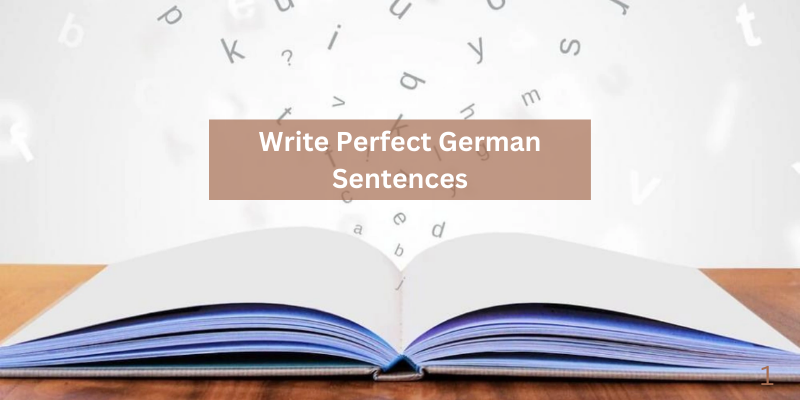
German is a language known for its precision, structure, and logical grammar rules. Whether you're just beginning to learn the language or aiming to enhance your skills, writing perfect German sentences is an essential goal. A strong command of sentence structure in German will improve your fluency and ability to communicate clearly and effectively in any situation. This blog’ll explore the fundamentals of writing perfect German sentences, including grammar tips, sentence structure, and practical exercises. If you're looking to master the language, enrolling in a German Language Course in Chennai can be a great step toward achieving fluency.
Understanding the Basic Structure of German Sentences
One of the first steps in writing perfect German sentences is understanding the basic structure. While it might initially seem complicated, German sentence structure is fairly logical. Most German sentences follow a Subject-Verb-Object (SVO) pattern, similar to English. However, German also has specific rules that can change word order, such as:
-
Main Clauses: In a typical main clause, the subject comes first, observed by the verb, and then the object (if any). For example:Ich liebe Deutsch. (I love German.)
-
Subordinate Clauses: These clauses often involve a change in word order, where the conjugated verb typically goes to the end. For example:Ich lerne Deutsch, weil ich in Deutschland leben möchte. (I am learning German because I want to live in Germany.)
Mastering German Word Order: The Key to Perfect Sentences
To write perfect German sentences, you must understand the flexible word order that depends on sentence type and context. There are a few key rules that guide word order in German:
-
Main Clauses: In main clauses, the verb takes the second position, regardless of what comes first (subject, time, or object). For example:Er fährt nach Berlin. (He is going to Berlin.)Morgen fahre ich nach Berlin. (Tomorrow, I am going to Berlin.)
-
Time, Manner, Place Rule (TMP): This rule refers to the general sequence in which time, manner, and place should be presented in a sentence. For instance:Ich gehe morgen früh mit meinen Freunden ins Kino. (I am going to the cinema with my friends tomorrow morning.)
Perfecting German Verb Conjugation
An essential element of writing correct German sentences is mastering verb conjugation. German verbs change according to the subject and tense, and they are key to determining sentence meaning. Verbs in German have regular and irregular forms, which is important when constructing sentences.
Regular Verbs: These follow a predictable pattern. For example, the verb spielen (to play) in the present tense is conjugated as:
Irregular Verbs: These verbs do not obey the regular pattern. For example, the verb sein (to be) in the present tense is conjugated as:
Mastering verb conjugation is crucial for ensuring the accuracy of your German sentences. Incorrect conjugation can make your sentence unclear or grammatically incorrect. If you want to improve your skills, you can learn German online and practice verb conjugation effectively.
Using Articles and Pronouns Correctly
Articles (definite and indefinite) and pronouns are essential for writing perfect German sentences, as they help clarify meaning and establish grammatical relationships. In German, articles must agree in gender, case, and number with the nouns they modify.
Avoiding Common Mistakes
While learning German, it's common to make a few mistakes. Here are some tips to avoid the most frequent errors:
Case Confusion: German has four cases—nominative, accusative, dative, and genitive. Knowing when to use each case is essential to forming correct sentences.
Word Gender: German nouns are gendered (masculine, feminine, or neuter), and the gender must be memorized because it affects articles and adjective endings.
Verb Placement: Pay attention to verb placement in questions, negative sentences, and subordinate clauses to ensure that your sentences are grammatically correct.
Adjective Endings: Adjectives in German change their endings based on the case, gender, and number of the noun they modify. Practice these endings to ensure your sentences sound natural. Mastering this can also open up career opportunities for German speakers in various fields.
Practicing German Sentence Writing
To write perfect German sentences, consistent practice is key. Here are some tips for effective practice:
-
Read and Imitate: Reading German texts, such as books, articles, or blogs, will expose you to a variety of sentence structures. Try to imitate these structures in your writing.
Writing Perfect German Sentences Takes Time and Practice
Writing perfect German sentences may seem challenging at first, but it becomes much more manageable with the right approach. By understanding German grammar structure, mastering verb conjugation, and avoiding common mistakes, you’ll be well on your way to writing clear, accurate, and effective German sentences. The legend to success is consistent practice and a willingness to learn from mistakes. So, start writing today, and watch your German writing skills improve over time. With dedication and patience, you can construct perfect German sentences quickly! If you're looking for guidance, enrolling in language classes in Chennai can help you refine your skills and gain confidence in your writing.
Read: Why German is an Asset for IT Professionals?